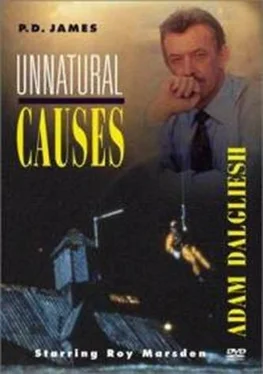P James - Unnatural Causes
Здесь есть возможность читать онлайн «P James - Unnatural Causes» весь текст электронной книги совершенно бесплатно (целиком полную версию без сокращений). В некоторых случаях можно слушать аудио, скачать через торрент в формате fb2 и присутствует краткое содержание. Жанр: Детектив, на английском языке. Описание произведения, (предисловие) а так же отзывы посетителей доступны на портале библиотеки ЛибКат.
- Название:Unnatural Causes
- Автор:
- Жанр:
- Год:неизвестен
- ISBN:нет данных
- Рейтинг книги:4 / 5. Голосов: 1
-
Избранное:Добавить в избранное
- Отзывы:
-
Ваша оценка:
- 80
- 1
- 2
- 3
- 4
- 5
Unnatural Causes: краткое содержание, описание и аннотация
Предлагаем к чтению аннотацию, описание, краткое содержание или предисловие (зависит от того, что написал сам автор книги «Unnatural Causes»). Если вы не нашли необходимую информацию о книге — напишите в комментариях, мы постараемся отыскать её.
Unnatural Causes — читать онлайн бесплатно полную книгу (весь текст) целиком
Ниже представлен текст книги, разбитый по страницам. Система сохранения места последней прочитанной страницы, позволяет с удобством читать онлайн бесплатно книгу «Unnatural Causes», без необходимости каждый раз заново искать на чём Вы остановились. Поставьте закладку, и сможете в любой момент перейти на страницу, на которой закончили чтение.
Интервал:
Закладка:
“It’s the most terrible tragedy. Poor boy! I don’t suppose we shall ever know what drove him to it. And he had everything to live for: youth, money, talent, looks, charm.”
This startlingly unrealistic assessment of Digby Seton was received in silence. Then Bryce said: “I grant you he had money, Celia. Or the prospect of it anyway. Otherwise one did tend to think of poor Digby as a whey-faced, ineffectual, conceited, vulgar little twit. Not that one bore him the least ill will. Nor, incidentally, does one believe that he killed himself.”
Latham burst out impatiently: “Of course he didn’t! And Celia doesn’t even believe it either! So why not be honest for a change, Celia? Why not admit that you’re as scared as the rest of us?”
Celia said with dignity: “I’m not in the least scared!”
“Oh, but you ought to be!” Bryce’s gnome-like face was creased with mischief, his eyes sparkled up at her. He looked suddenly less harassed, less like a tired old man. “After all, you’re the one who gains by his death. There should be a nice little sum left even after double death duties. And Digby’s been a fairly regular visitor to you recently, hasn’t he? Didn’t he lunch with you yesterday? You must have had plenty of opportunities to slip a little something into his flask. You were the one who told us that he always carried it. In this very room. Remember?”
“And where am I supposed to have got hold of arsenic?”
“Ah-but we don’t know yet that it was arsenic, Celia! That’s exactly the kind of remark that you shouldn’t make. It doesn’t matter in front of Oliver and me but the Inspector may get wrong ideas. I do hope you haven’t been talking to him about arsenic!”
“I haven’t been talking to him about anything. I’ve merely answered his questions as fully and honestly as I can. I suggest you and Oliver do the same. And I don’t know why you’re so keen to prove Digby was murdered. It’s this morbid love you both have for looking on the dark side.”
Latham said dryly: “Just a morbid love of looking facts in the face.”
But Celia was undaunted: “Well, if it were murder, all I can say is that Jane Dalgliesh was very lucky to have Adam with her when she found the body. Otherwise people might begin to think. But a CID Superintendent-well, naturally he knows how important it is not to disturb anything or tamper with the evidence.”
Dalgliesh, too fascinated by the enormity of the remark and Celia’s capacity for self-deception to make his protest, wondered whether she had forgotten that he was there. The others seemed to have forgotten too.
“What might people begin to think?” asked Latham quietly.
Bryce laughed. “You can’t seriously suspect Miss Dalgliesh, Celia! If so you’re shortly going to be faced with the delicate problem of etiquette. Your hostess is at this moment preparing coffee for you with her own hand. Do you drink it gracefully, or pour it surreptitiously into the flower vase?”
Suddenly Eliza Marley swung round at them: “For God’s sake shut up, both of you! Digby Seton’s dead and he died horribly. You may not have liked him but he was a human being. What’s more he knew how to enjoy life in his own way. It may not have been your way but what of it? He was happy planning his horrible nightclubs and deciding how to spend his money. You may despise that but he wasn’t doing you any harm. And now he’s dead. And one of us murdered him. I don’t happen to find that amusing.”
“My dear, don’t distress yourself.” Celia’s voice had taken on the vibrant, emotional tone which she now almost unconsciously assumed when dictating the more highly charged passages in her novels.
“We’re all used to Justin by now. Neither he nor Oliver cared one whit for Maurice or Digby so it’s no use expecting them to behave with ordinary decency, let alone respect. I’m afraid they care for no one but themselves. It’s pure selfishness, of course. Selfishness and envy. Neither of them has ever forgiven Maurice for being a creative writer when all they’re fit for is to criticise other people’s work and batten on other men’s talent. You see it every day: the envy of the literary parasite for the creative artist. Remember what happened to Maurice’s play? Oliver killed it because he couldn’t bear to see it succeed.”
“Oh that!” Latham laughed. “My dear Celia, if Maurice wanted to indulge in emotional catharsis he should have consulted a psychiatrist, not inflicted it on the public in the guise of a play. There are three essentials for any playwright, and Maurice Seton hadn’t one of them. He must be able to write dialogue, he must understand what is meant by dramatic conflict and he must know something about stagecraft.”
This was no more than Latham’s professional theme song and Celia was unimpressed.
“Please don’t talk to me about craftsmanship, Oliver. When you have produced a work which shows the slightest sign of original creative talent there will be some point in discussing craftsmanship. And that goes for you too, Justin.”
“What about my novel?” demanded Bryce, affronted. Celia cast him a long-suffering look and sighed deeply. She was obviously not prepared to comment on Bryce’s novel. Dalgliesh recalled the work in question: a short exercise in sensitivity which had been well received but which Bryce had apparently never found the energy to repeat. He heard Eliza Marley’s laugh.
“Isn’t that the book the reviewers said had the intensity and the sensitivity of a short story? Hardly surprising when essentially that was all it was. Even I could keep the sensitivity going for a hundred and fifty pages.”
Dalgliesh did not wait to hear more than Bryce’s first protesting wail. Predictably the argument was degenerating into literary abuse. He wasn’t surprised, having noticed this tendency before in his writing friends, but he had no wish to get involved. At any moment now they would be canvassing his opinion and his own verse no doubt would be subject to the devastating candour of the young. True, the argument appeared to be taking their minds from the subject of murder but there were more agreeable ways of getting through the evening.
Holding the door open for his aunt as she came in with the tray of coffee, he took the opportunity to slip away. It was perhaps a little unkind to abandon her just at this moment to the contentions of her guests but he didn’t doubt her capacity to survive. He was less sure of his own.
His room was still and very quiet, insulated by sound building and oak boards from the jabber of the dissenting voices below. He unlatched the window in the seaward wall and forced it open with both hands against the blast of the gale. The wind rushed into the room swirling the bed cover into folds, sweeping the papers from his desk and rustling the pages of his bedside Jane Austen like a giant hand. It took his breath away so that he leaned gasping against the window ledge, welcoming the sting of spray on his face and tasting the salt drying on his lips. When he closed the window the silence seemed absolute. The thundering surf receded and faded like the faraway moaning on another shore.
The room was cold. He hitched his dressing gown around his shoulders and switched on one bar of the electric fire. Then he gathered up the scattered sheets of paper and replaced them with obsessive care, sheet on sheet, on the small writing table. The square white pages seemed to reproach him and he remembered that he hadn’t written to Deborah. It wasn’t that he had been too indolent, too busy or too preoccupied with the problem of Seton’s murder. He knew perfectly well what had held him back. It was a cowardly reluctance to commit himself further by even one word until he had made up his mind about the future. And he was no nearer that tonight than he had been on the first day of the holiday. He had known when they said goodbye on his last evening that she understood and accepted that this break was in some way crucial for them, that he wasn’t driving alone to Monksmere solely to escape from London or recover from the strain of his last case. There was no reason, otherwise, why she shouldn’t have come with him. She wasn’t as tied to her job as all that. But he hadn’t suggested it and she had said nothing except that last “Remember me at Blythburgh.” She had been at school near Southwold and knew and loved Suffolk. Well, he had remembered, and not only at Blythburgh. Suddenly he longed for her. The need was so intense that he no longer cared whether it was wise to write. In the face of this craving to see her again, to hear her voice, all his uncertainties and self-distrust seemed as unimportant and ludicrously unreal as the morbid legacy of a nightmare fading in the light of day. He longed to talk to her, but with the sitting room filled with people there would be no chance of telephoning tonight. Switching on the desk lamp he sat at the table and unscrewed his pen. The words, as sometimes happened, came simply and easily. He wrote them down without pausing to think too much or even to wonder whether he was being sincere.
Читать дальшеИнтервал:
Закладка:
Похожие книги на «Unnatural Causes»
Представляем Вашему вниманию похожие книги на «Unnatural Causes» списком для выбора. Мы отобрали схожую по названию и смыслу литературу в надежде предоставить читателям больше вариантов отыскать новые, интересные, ещё непрочитанные произведения.
Обсуждение, отзывы о книге «Unnatural Causes» и просто собственные мнения читателей. Оставьте ваши комментарии, напишите, что Вы думаете о произведении, его смысле или главных героях. Укажите что конкретно понравилось, а что нет, и почему Вы так считаете.












